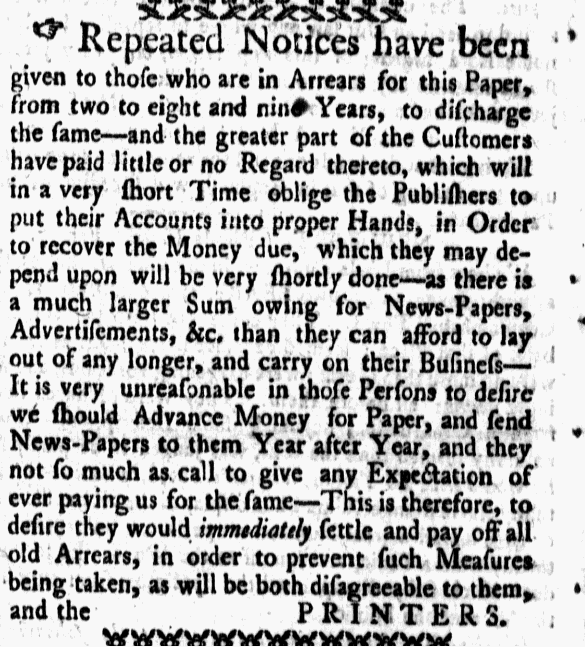GUEST CURATOR: Trevor Delp
What was advertised in a colonial newspaper 250 years ago this week?

“AS many Persons Licenced to sell Spirituous LIQUORS … have neglected to render their Accounts of Sale of such Liquors.”
During the eighteenth century in North America the production and distribution of rum was becoming increasingly popular. In 1733, Great Britain enacted the Molasses Act as apart of the Navigation Acts. The Molasses Act imposed a tax on molasses, sugar, and rum imported to the colonies. This act was largely ignored by the colonists and loosely enforced by the British. Several years later it was replaced by the Sugar Act of 1764. This act was designed to impose taxes at half of the rate that the Molasses Act did, but be strictly enforced. Many of these acts were put into place to rescue Britain from the enormous debt it had allotted during the Seven Years War, although the colonists did not respond well to Britain’s acts. Many of the colonists felt that they were not responsible for the debt Britain had acquired over the Seven Years War and were reluctant to give in.
In addition, colonists were used to taxing themselves, such as through the local excise tax George Jaffrey mentions in this advertisement threatening prosecution against colonists who had been cheating the taxes. Advertisements like the one here are interesting because they were a broad way for officials to address the public without physical confrontation that could result in further uproar and unrest. As the local receiver of the colony’s excise taxes, Jaffrey made it known to colonists that they were no longer to break the law and go unnoticed and that they must now reconcile their actions or face prosecution. He took this action at the same time Parliament cracked down on colonists with the Sugar Act.
**********
ADDITIONAL COMMENTARY: Carl Robert Keyes

Colonists were indeed accustomed to raising revenues through taxes they assessed internally via their colonial legislatures, which helps to explain why they bristled so much when Parliament stepped in and attempted to enact and better enforce new methods of raising revenues through collecting taxes throughout the empire.
Edward J. Perkins compiled a list of the “Types of Domestic Taxes, 1763-1775” enacted locally by colonial assemblies in the period between the Seven Years War and the Revolution.[1] Examining the many kinds of taxes colonists already paid (or were expected to pay but often avoided, as Jaffrey’s notice indicated) offers additional context for understanding why they reacted so vehemently to Parliament’s new efforts to tax and regulate the colonial economy in the 1760s and 1770s.
- Land – unimproved: Rhode Island, Pennsylvania
- Land – assed value: Massachusetts, Rhode Island, Connecticut, Pennsylvania, New Jersey
- Land – per acre: Virginia, Maryland, South Carolina, Georgia
- Other property – assessed: Massachusetts, New Jersey, South Carolina
- Excise – liquor, etc. – New Hampshire, New York, Maryland, Virginia, North Carolina
- Merchant profits – Massachusetts, New Hampshire, Pennsylvania, Connecticut, Rhode Island, South Carolina
- Import – finished goods: Pennsylvania, New York, Georgia
- Import – slaves: New York, Maryland, South Carolina
- Export – tobacco: Maryland, Virginia
- Poll – flat: Maryland, Virginia, North Carolina
- Poll – linked to wealth: Connecticut, Massachusetts, Rhode Island
- Poll – discriminatory toward free blacks: South Carolina, Georgia
The advertisements in this particular issue of the New-Hampshire Gazette indicate that “Persons Licenced to sell Spirituous LIQUORS” were not the only people who neglected to settle up their accounts. The printers inserted this notice, stating that “there is a much larger Sum owing for News-Papers, Advertisement, &c., than they can afford to lay out any longer.” They called on debtors to “immediately settle and pay off old Arrears” and, not unlike Jaffrey, the printers threatened “such Measures being taken, as will be … disagreeable” to those who did not pay.
**********
[1] Edward J. Perkins, The Economy of Colonial America, 2nd ed. (New York: Columbia University Press, 1988), 191.
